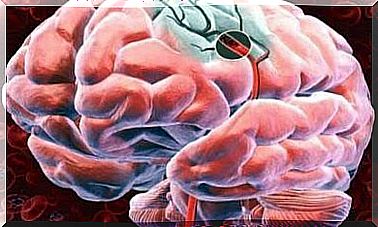Numbness In The Hands: Why Is This Happening?
Numbness in the hands can be due to a simple situation such as a cold. But it can also be a symptom of a serious illness. You can find out more about this in this article.

Numbness in the hands is a common, uncomfortable sensation. It consists in that this area of the body becomes rigid or inflexible. In addition, it is often accompanied by a tingling sensation.
It’s a common cause of doctor visits. The problem is that its origins are very diverse, so making the correct diagnosis can be complicated. In this article we will explain everything you need to know about numbness in the hand and what is its most typical origin.
What is numbness in the hands?
As we anticipated, numbness in the hands is a change in the sensitivity and movement of this part of the body. The sense of touch is distorted and moving the fingers becomes uncomfortable.
In addition to the tingling sensation, burning or tickling are common side effects. Depending on the cause, the affected person experiences the numbness either in the fingers, in one or in both hands.
One reason for numbness in the hands can be cold. This is a very common cause that usually has no consequences. However, according to a study conducted in Sweden, the most common cause is carpal tunnel syndrome. This study explains that one in five people who experience this symptom is likely to have carpal tunnel syndrome.

Causes of hand numbness
A variety of situations can cause numbness in the hand. It occurs because of damage to the nerves (for example, because they are pinched or injured) that supply nerve stimuli to the upper extremity, or because of systemic diseases that affect that area.
However, it is also possible that the problem is originating in the brain or spinal cord, as these are two organs that coordinate both sensitivity and motor skills. But these lesions are usually more serious and associated with obvious or disabling symptoms.
Metabolic and infectious diseases, as well as certain medical treatments, also lead to this situation. In the following sections we will explain the main causes of this problem in more detail.
Brain and nervous system disorders
Any pathology affecting the nervous system, if damaged in an area related to the hands, can cause numbness there. This is the case, for example, with Guillain-Barré syndrome.
This is a disease in which the immune system attacks nerve cells. Numbness of the hands is one of its diagnostic symptoms.
This is also related to cervical spondylosis, because it consists of signs of wear and tear on the intervertebral discs from which the nerves originate that lead to the limbs such as the hands.
Injury or overuse
The carpal tunnel syndrome, which we mentioned at the beginning, belongs to this category. It is a condition in which the median nerve that runs from the forearm to the fingers is pinched. This causes wrist pain, numbness, cramps, and tingling sensations.
While this is the main cause, there are other syndromes and injuries that also cause numbness, such as ulnar channel syndrome, where another nerve is pinched. The same thing happens with injuries to the arm plexus after an accident.
The last mechanism is about a crush or entrapment. The brain misinterprets the signals coming from the pinched nerves and sends cues to the hands of tingling, pain, and even paralysis.
Infectious diseases that cause numbness in the hands
Lyme disease is an infection caused by the bite of certain types of ticks. According to the Centers for Disease Control and Prevention , numbness in the hands is common if treatment is not started immediately.
Another infectious disease that can cause this symptom is syphilis. In this case, a similar phenomenon occurs as in the previous disease. If treatment is delayed, it will cause damage to the nervous system due to the development of symptoms.
Chronic disorders
There are many diseases which, as they progress, lead to nerve damage. The end result is an altered sensitivity and motor skills. Diabetes is one of the most important and common diseases here. It causes what is known as diabetic neuropathy , which, according to the University of California, is associated with numbness in the hands.
Alcohol consumption, amyloidosis, and multiple sclerosis are also chronic processes that affect the upper limbs. Although cancer itself is not the most common cause of this symptom, chemotherapy is a combination of drugs that causes this side effect.

Other possible causes of hand numbness
There is also evidence of the connection between ganglia (nerve nodes) and numbness of the hands. These are cysts that often appear in the joints, such as the wrist. If they get too big or put pressure on a nearby nerve, a numbing effect will be felt.
Vasculitis, on the other hand, can be the cause as it reduces blood flow to the palm and fingers. Vasculitis is inflammation of the walls of the arteries that narrows the arteries. When less oxygen gets into the tissue, it reacts with signs of damage.
When is a doctor’s visit necessary?
If you notice numbness in your hands, it is imperative that you see a doctor. He should do a physical exam and appropriate supplemental tests to arrive at a diagnosis.
As we have seen, the causes are manifold, so that there is not always a clear solution right from the start. A number of approaches are required to identify the origin that triggers the disease in a specific case. Still, you don’t need to worry, because in most cases the causes can be eliminated very easily.









